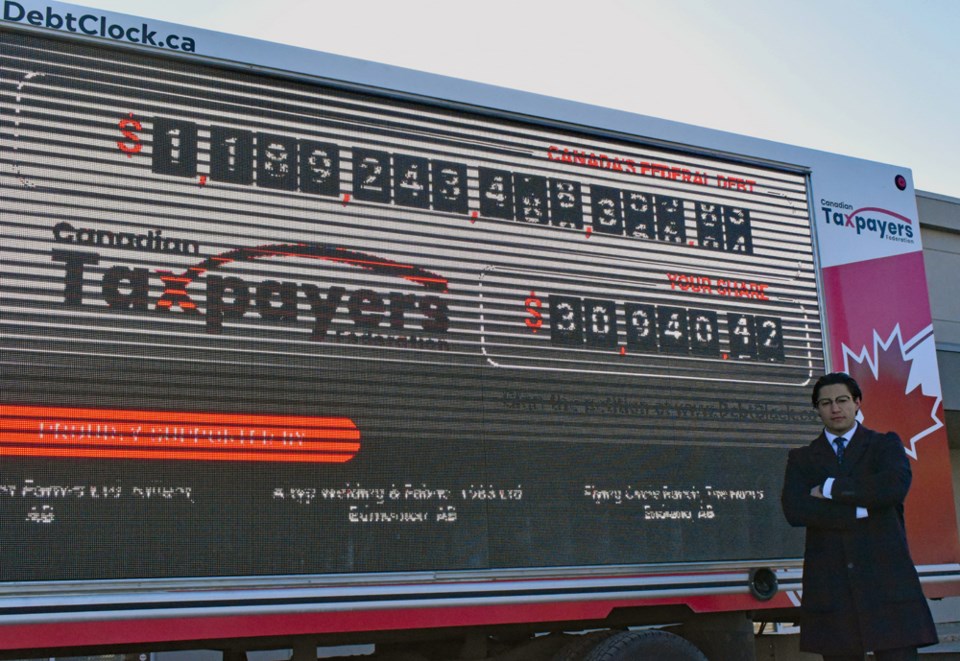SASKATOON — Hardworking Canadians owe the federal government more than $30,000 each to pay for the national debt, an amount that continues to balloon unless Prime Minister Justin Trudeau takes the needed action.
The Canadian Taxpayers Federation, a non-profit citizen’s group founded in 1990 in Saskatchewan that advocates for more government accountability and lowering of taxes, made a brief stop in Saskatoon Friday morning during their National Debt Clock tour.
“We are a non-profit and non-partisan organization. We’ve been around for 30 years, fighting for lower taxes and less waste and a more accountable government,” said CTF federal director Franco Terrazzano.
“We’ve been taking some form of the debt clock across Canada since the 1990s but we had to get a brand new debt clock since the Trudeau government’s $1 trillion debt broke the last one. The last debt clock didn’t have enough digits to show the full $1 trillion. So, I guess we underestimate the politicians' [ability] to spend everyone’s money.”
Terrazzano told SASKTODAY.ca that the CTF is going to drive to the East Coast after starting in Victoria, British Columbia. They made several stops in other cities and towns in B.C. and Alberta before heading to Saskatoon.
The Debt Clock is a huge digital counter mounted on both sides of a moving box truck where the real-time $1-trillion debt of the federal government that is increasing by the second is displayed.
“What we’re doing is we’re sounding the alarm over runaway deficits in debt. So, the debt clock has a huge display and it’s showing the federal government’s $1 trillion debt go up in real-time. It’s increasing by $4,500 in every second,” said Terrazzano, who drove with two of his companions for their next stop in Regina.
Terrazzano added that the increasing federal debt leaves each resident of Saskatoon alone owing to the government more than $30,000.
“They are already on the hook for more than $30,000 in federal government debt. Now, I don’t know too many people who have that kind of money lying around to pay their politician’s credit card bills,” he said.
“That’s why it’s so important for Prime Minister Trudeau to stop this deep dive into debt. That’s why we’re doing this. That’s why we’re taking the debt clock coast to coast to wake up more Canadians to the $1 trillion debt problem.”
Using COVID as an excuse
Terrazzano laments the inaction from the Trudeau government to address the federal debt that was further affected by the COVID-19 pandemic.
“We see this government use the fog of COVID-19 to go on a debt-fuelled spending binge and what’s frustrating is that even before the pandemic, the federal government was spending at all-time highs,” he said.
“That means in 2018, before the pandemic and before any cross-country recession, the Trudeau government was spending more money than the federal government did during any single year during World War II. Even after considering inflation and population growth.”
He added that years of spending make finding savings in every area of the government like finding water in the ocean.
“He’s [Trudeau] making the tough times tougher. We’re going through a pandemic. We’ve had two years of revolving lockdowns. A lot of people had lost their jobs or had to take pay cuts, many people lost their businesses,” said Terrazzano.
Consumers, already hurting from the effects of the pandemic, will also have to deal with the looming increase of 11 cents per litre for gasoline due to the carbon tax, which will be enforced beginning next week on April 1.
“During the pandemic, we’ve seen the federal government continue to raise its carbon tax. Right now, gas prices are so high. So many people in Saskatchewan are struggling with the rising cost of living. Now, the Trudeau government is getting to raise the carbon tax again,” said Terrazzo.
“It should have been a no-brainer to scrap the tax because people need relief and the carbon tax and other policies are making the tough times tougher for the people of Saskatoon … The Trudeau government is not stopping there. [Trudeau] wants to soak drivers for nearly 40 cents per litre of gasoline through the carbon tax by 2030. It’s completely unaffordable.”




